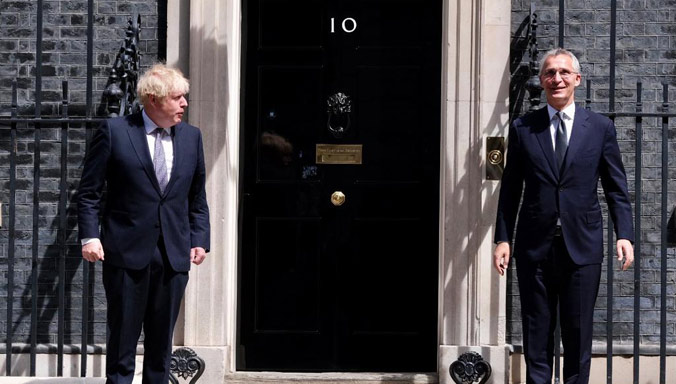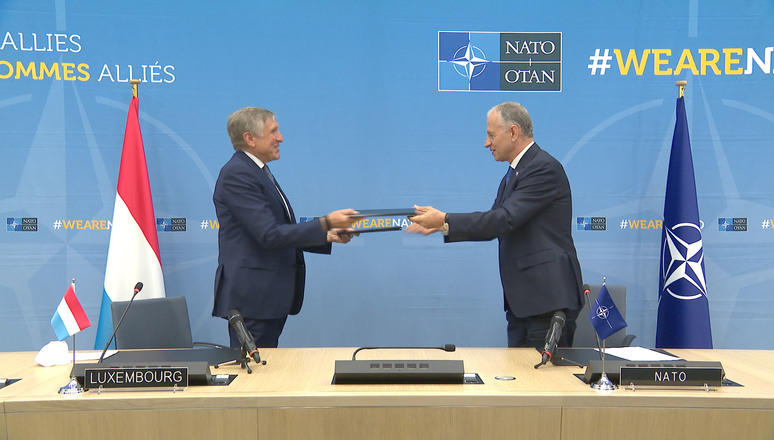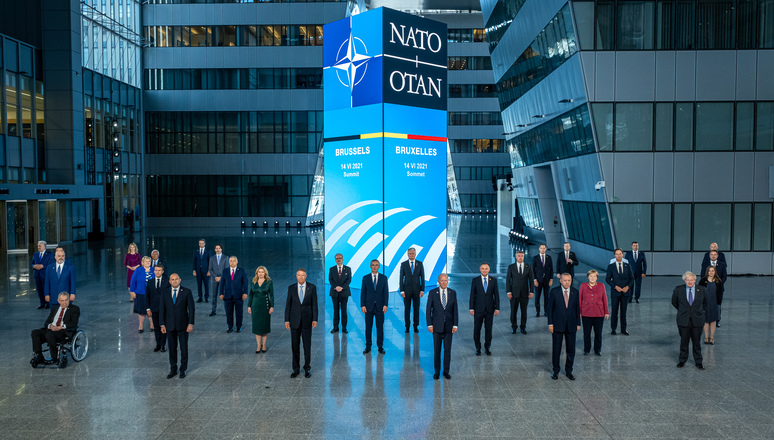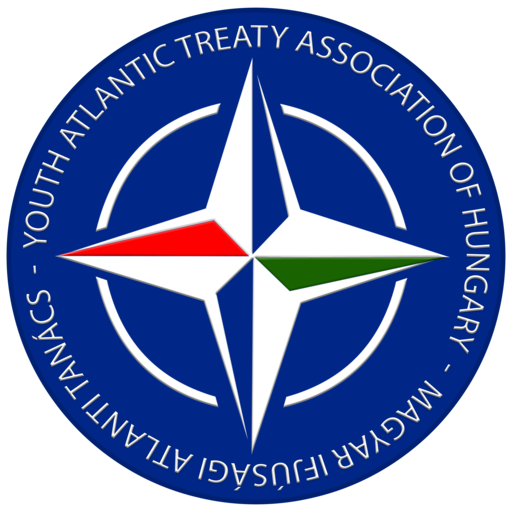In the „NATO Social Update Briefing” of the Youth Atlantic Treaty Association of Hungary, we bring you the contemporary news of the Alliance every month.
Women and NATO
Gender Equality is the smart thing to do
In a video keynote addressed at the Women Political Leaders Summit on 21 June, NATO’s Secretary General stressed the importance of gender equality in NATO’s mission. NATO has long recognised the need for increased women’s participation and leadership in defence and security.
Since 2018, the Alliance’s revised policy on Women, Peace and Security requires the integration of gender perspective all across NATO’s policies, programmes, missions and operations. It also encourages a more gender-inclusive environment and sets the highest standards of behaviour for NATO personnel.
At the Brussels Summit on 14 June, NATO Leaders took a new significant step with the endorsement of NATO’s new policy on Preventing and Responding to Conflict-Related Sexual Violence.
Partnerships
Admiral Rob Bauer begins his tenure as Chair of the NATO Military Committee
On 25 June, Admiral Rob Bauer of the Royal Netherlands Navy took over as Chair of the NATO Military Committee. Elected in October 2020, Admiral Bauer begins his three-year tenure just one week after the Brussels Summit with Heads of State and Government.
Speaking during his inaugural address to the Military Committee, Admiral Bauer stressed, “We need to ensure NATO’s responsiveness, readiness and reinforcement.” As the Alliance adapts for the future, the Military Committee will ensure that it continues to be the essential link between the political decision-making process and the military structure of NATO, translating political decision and guidance into military direction, and for recommending measures considered necessary for the defence of the transatlantic area.
In this time of political power shifts and increasingly complex security threats, Admiral Bauer strives to be a catalyst between NATO’s military leaders, “As Chair, I will strive to unify north, south, east and west, large and small.”
Secretary General lauds UK’s role in NATO
On 2 June, Prime Minister Boris Johnson and Secretary General Jens Stoltenberg met to discuss relevant issues and goals as a preparation for the NATO Summit on 14 June. “The United Kingdom is a staunch and highly valued NATO Ally,” said the Secretary General. Prime Minister Boris Johnson further endorsed the strong ties between his country and NATO by stating that “NATO guarantees peace and security in Europe for decades, NATO brings together North-America and European countries in a mutual alliance, mutual guarantee of security and defence and it’s been outstandingly successful, and I think it will be outstandingly successful for decades to come.” They both emphasised the importance of unity between NATO allies in times of global competition that we live in. The leaders further agreed that joint action is needed against intimidations from the East, particularly emphasising the breach of international norms and rules by the regime in Minsk with the capture of the Belarusian journalist. The leadership of the UK towards NATO is extremely important as the country is a vital link between the two sides of the Atlantic. As Mr Johnson reiterated at the Summit, the UK is indeed committed to the Alliance, “NATO is not just important to the UK’s security, it is our security”.

Missions
Ten Allies start new era in pilot training
Defence Ministers from 10 NATO countries on 9 June, agreed to bolster the training of their nation’s military pilots, taking advantage of new technologies such as virtual reality.
As part of NATO’s Flight Training Europe programme (NTFE) Ministers agreed to create a network of European training centres for fighter jet, helicopter and drone pilots. This NATO High Visibility Project will reduce training costs and increase interoperability among participating air forces.
This first-of-its-kind initiative will involve the gradual build-up of a network of European training campuses covering different aspects and types of aircrew training. They will provide Allies with access to a wider range of training opportunities beyond what most Allies could sustain independently and at a fraction of the cost. NFTE campuses will provide aircrews with cutting-edge training, including the use of virtual reality technology and simulation.
Hungary, Belgium, the Czech Republic, Greece, Italy, Montenegro, North Macedonia, Romania, Spain, and Turkey are participating in the programme which will also leverage existing training infrastructure in participating nations.
NSPA to support Takuba Task Force in Mali
On 9 June, the NATO Support and Procurement Organisation (NSPO) signed an arrangement with the Ministry of Armed Forces of the French Republic, in support of the Takuba Task Force for the provision of services in Mali. The provision includes food and base services, engineering and fuel services, infrastructure maintenance, as well as intra-theatre transportation.
The Takuba Task Force is comprised by several European countries and led by France, which advises and assists Malian Armed Forces in their fight against terrorism in the Sahel, working together with other international actors, including the United Nations MINUSMA.
The NATO NSPA will support a camp in Menaka, in eastern Mali, with a capacity of about 500 people. The personnel will be deployed by the end of the summer to conduct site management and provide logistical support to operations. The Ministry of Armed Forces assured that this cooperation agreement testifies France’s commitment to permanently install Task Force TAKUBA in Mali for the benefit of operational cooperation with African partners.
Deputy Secretary General inaugurates Jordan’s Military Women’s Training Centre
NATO’s Deputy Secretary General Mircea Geoană marked the inauguration of the Military Women’s Training Center in Jordan in a virtual address on 7 June. Royal Highness Princess Salma Bint Abdullah, as well as representatives from the Czech Republic and Norway, lead nations of the projects, took part in the ceremony in Amman. The Centre, which has been operational since November 2020, supports Jordan’s goal to attain 3% female representation in its armed forces and to offer women wider career opportunities.
Norway and the Czech Republic were lead nations of the projects. Other Allies and Partner nations also helped financed the construction of the Centre through NATO’s Trust Fund III for Jordan. Established in 2014, NATO’s Trust Fund III for Jordan focused on enhancing the role of Jordanian servicewomen through policy, infrastructure and training initiatives.
Developments
NATO and Luxembourg boost Alliance Space Situational Awareness
Supported by Luxembourg, NATO plans to develop a Space Situational Awareness Capability that will provide NATO Headquarters with a clearer situational awareness of space.
At the 14 June Brussels Summit, NATO and Luxembourg signed a Joint Statement to develop a Strategic Space Situational Awareness System (3SAS) in the Situation Centre’s Geospatial Section at NATO HQ. With 6.7 million Euro funding from Luxembourg, this capability will allow the Alliance to better understand space objects and events, and their effects across all domains. The project will support the NATO’s Space Centre established in Germany, in 2020.
Space is becoming more congested, contested and competitive. NATO is an appropriate forum for Allies to share information, increase interoperability and coordinate actions in space, said Deputy Secretary General Mircea Geoană. Allies agreed to strengthen their space domain awareness and better integrate space in Alliance activities, including training and exercises, resilience and innovation efforts.

NATO and partner countries are cooperating on advanced technologies
Advanced technologies are rapidly transforming the world – including the security landscape – and are one of the major agenda items of the 2021 NATO Summit in Brussels and the NATO 2030 Initiative. NATO member and partner countries are working together to mitigate risks and embrace opportunities presented by advanced technologies, including emerging and disruptive technologies (EDTs).
EDTs are technologies that undergo rapid development and can be disruptive to existing systems such as critical infrastructure, supply chains, data networks and much more. NATO recognises both the risks and opportunities that they present and is working to maintain the Alliance’s technological edge as well as to promote a norms-based use of new technologies.
Taking into account the imminent and complex threats posed by today’s cyber landscape, it is crucial for NATO and its partners to explore more secure ways of transmitting information. Professor Miroslav Vozňák is one of the scientists working on the recently launched QUANTUM5 project supported by the SPS Programme, which investigates quantum communication and quantum mechanics – the interactions of molecules, atoms or photons – to securely transmit data.
The SPS Programme supports projects on autonomous systems – technologies that can function at least partially on their own without direct human instruction – in all physical domains (ground, maritime, air and space). One of these initiatives is DAVOSS – a project led by scientists from Italy and Israel – that is developing a cloud-based architecture capable of integrating a large number of different sensors (cameras, thermal and noise sensors, unmanned systems, etc.). High-altitude balloons then control the sensors and manage teams of interconnected unmanned aerial vehicles as well as analyse and transmit the information collected. The disruptive potential of emerging technologies is much greater when they are combined in a novel manner. NATO’s SPS Programme is therefore actively supporting activities which bring together the perspectives of different technological research fields and can assist in identifying these challenges and proposing innovative solutions for the future.
Statements
NATO’s role in protecting democratic values
Deputy Secretary General Mircea Geoană underlined NATO’s important role in protecting democratic values in a panel discussion at the Brussels Forum on 17 June.
Strong common values and adaptation to evolving security challenges make NATO the most successful Alliance in history, he said. Describing democracy as “a work in progress”, he underlined the need to continuously modernise our democracies and counter adversaries that attempt to undermine it.
The Deputy Secretary General also noted that deepening cooperation with like-minded partners, including the European Union, is vital to protecting the rules-based international order. He also underscored that NATO needs to engage in dialogue with countries that do not share our values, like Russia and China, in the interest of stability.
Leaders agree NATO 2030 agenda to strengthen the Alliance
NATO Heads of State and Government on 14 June agreed a set of proposals under the NATO 2030 banner, covering a range of issues, including the protection of critical infrastructure, promoting innovation, boosting partnerships and making the fight against climate change an important task for NATO for the first time.
“By agreeing the NATO 2030 agenda, leaders have taken decisions to make our Alliance stronger and better fit for the future”, Secretary General Jens Stoltenberg told at a press conference. He said Allies also agreed to keep defence investments up, with 2021 due to be the seventh consecutive year of rising defence budgets across European Allies and Canada.
The Summit also took decisions on enhancing the capabilities to defend against cyberattacks and reaffirmed the Allies’ commitment to Afghanistan. NATO leaders also had substantive discussions about Russia and China which Mr. Stoltenberg said are “authoritarian regimes” that “challenge the rules-based international order.”
Summit comes at „pivotal moment” for Alliance
At the NATO Summit that was held on the 14 June, Secretary General Jens Stoltenberg said that the meeting would be a pivotal moment for the Alliance and a time to “open a new chapter in our transatlantic relations.”
The agenda of the meeting included NATO’s relations with Russia, which Stoltenberg said were “at its lowest point since the Cold War because of Russia’s pattern of aggressive behaviour”, as well as China, which offers opportunities but “also poses some challenges to our security”.
Against this background, the Secretary General stressed that leaders would agree on an ambitious NATO 2030 agenda, which includes reinforcing collective defence, strengthening resilience, sharpening our technological edge, and making climate and security an important task for the Alliance. Allied leaders are also expected to agree to keep defence spending up, Mr Stoltenberg said, and “to invest more together, to meet our higher level of ambition”.

